Thomas Harris
(1817 - date of death unknown)
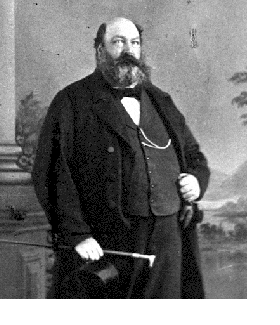
Thomas Harris was born in England in 1817 and moved to Victoria in 1858 during the Caribou Gold Rush. He immediately opened a slaughterhouse but soon became a butcher. He opened Vancouver Island's first butcher shop named the "Queen's Meat Market," where he made his fortune. He attended the first organisation meeting of the freemasons above Southgate's shop in 1860. He was elected as the first mayor of Victoria in 1862 and lasted until 1865.
Lumley Franklin
(1808 - August 3rd, 1873)
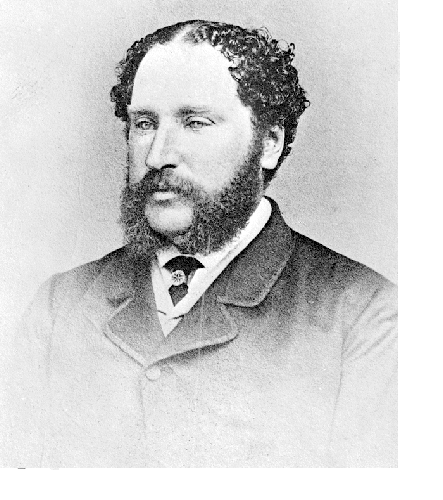
Lumley Franklin was born in Liverpool, England circa 1820 and emigrated to the United States in 1845. While in California, he became a member of the Occidental Lodge no. 22. In August 1858, Franklin moved to Victoria with his younger brother, Selim, to open an auctioneer and land agent store during the Fraser River Gold Rush. Both Lumley and Selim helped create the Victoria Philharmonic Society and performed in numerous musical performances.
The first mayor of Victoria, Thomas Harris, nominated Franklin to be his successor in 1865, the same year the telegraph cable was linked to Victoria, which Franklin was praised for. 1865 was also the year Franklin, a founding member of freemasonry in Victoria, became Worshipful Master at Victoria Lodge no. 1085. He also became a member of the first Vancouver Island Board of Education in 1867 along with Israel Wood Powell, another prominent Mason.
Amor de Cosmos
(August 20, 1825 - July 4th, 1897)
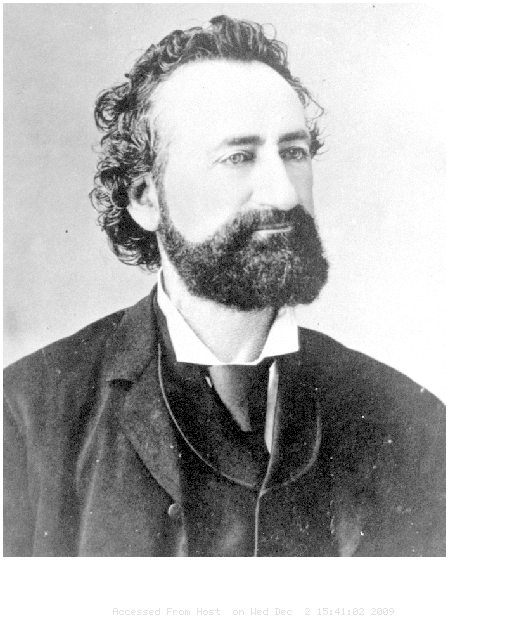
Amor de Cosmos was born William Alexander Smith on August 20, 1825. Although he was born in Windsor, Nova Scotia, he spent most of his life on the West Coast. He changed his name and was initiated as a mason while living in Mud Springs, CA. He came up to British Columbia in 1858 when gold was found on the Fraser River.
Displeased with the local publications, he created the Daily British Colonist, which quickly became a popular liberal publication. Although Sir James Douglas vocally voiced his disapproval of the Colonist, it outlasted all other publications in the area, eventually evolving into the Victoria Times Colonist, which is still in print today.
He eventually went into politics in 1863. He ran for the Legislature of Vancouver Island using a platform based on his objections of the dominance of the Hudson’s Bay Company running the whole of Victoria using what he called "the family-company compact". He lost, but he became well known as BC’s Father of Confederation for becoming a leading force in the province’s Confederation League. Despite this, his left wing tendencies did not endear him to Parliament and he was passed over as British Columbia’s first premiere. He was eventually chosen as the second premiere in December 1872, and served a very successful run until February 1874, when he was ousted after trying to change the terms of union. He continued as a Member of Legislative Assembly for Victoria until he retired in 1882, after losing the federal election of that year.
Robert Burnaby
(November 30th, 1828 - January 10th, 1878)
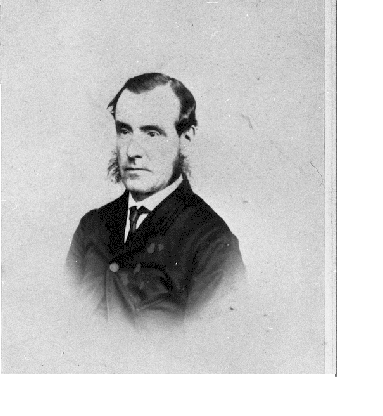
Robert Burnaby was born on Nov 30, 1828 in Misterton Leicester. In 1853, he heard about the Fraser River gold discovery in British Columbia. With this news, he entered a partnership with his friend Edward Henderson, and together they founded the Henderson and Burnaby firm. Henderson ran the office from London while Burnaby took care of the firm's interests in Victoria.
Burnaby arrived in Victoria with a letter of introduction from British Colonial Secretary, Lord Edward Bulwer-Lytton, to Governor James Douglas. The letter was a vouched for his character instead of any qualifications for a public service job. Despite these reservations, Colonel Moody appointed Burnaby as his private Secretary. In August of 1859, The colony’s finances were on shaky ground and all government employees were dismissed.
Burnaby became active in the banking and legislative areas in Victoria. He was the chairman at the first meeting of the Victoria Chamber of Commerce held on February 9th, 1963, where he was elected the first president.
When James Cooper resigned from the Legislative Assembly in October of 1860, Burnaby offered his candidacy for the seat of representative of Esquimalt. Burnaby remained as representative of Esquimalt until he resigned in 1865.
As there was no freemasonary Lodge in Victoria when Burnaby arrived, he helped establish the first Lodge in Victoria on August 20th, 1860. He was the master of Victoria Lodge in 1863 and again in 1865. In September 1867, a District Grand Lodge was formed and Burnaby was chosen to be the District Grand Master. In 1871, when the Grand Lodge was founded, Burnaby became the Immediate Past Grand Master.
Simeon Duck
(December 1st, 1834 - February 5th, 1905)
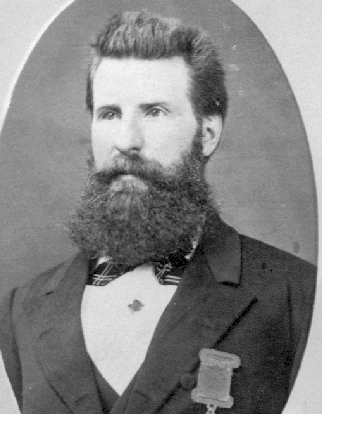
Simeon Duck arrived on Vancouver Island in 1859. He left to work at the Fraser River Mines, but he returned later that year and opened a carriage factory. He supported Confederation and was elected to the BC Legislature. In 1882 he ran as an independent and became finance minister; a position he held until 1886.
Duck became Worshipful Master in the Vancouver Lodge in 1868, and he was a member of both Vancouver Lodge and Quadra Lodge, stepping down in 1881.
Edgar Crow Baker
(1845 - November 3rd, 1920)
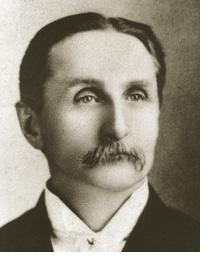
Edgar Crow Baker, an accountant and accomplished member of the navy, came to Victoria with his family in 1874. He worked for three years as the accountant for the Hastings Mill Company and was elected to the Victoria City Council in 1882. He was also elected to the House of Commons the same year, but he stepped down in 1889 for business reasons. In 1882, he organized the Victoria and Esquimalt Telephone Company, which is still in service today as part of Telus.
He was initiated in the Cumberland Kilwinning Lodge from Port Glasgow, Scotland, and became part of the Victoria-Columbia Lodge no. 1 in 1874. He was Senior Warden of his lodge in 1879, Worshipful Master in 1880, Grand Secretary of the Grand Lodge of British Columbia from 1880 to 1883, and Grand Master in 1883-84.
Israel Wood Powell
(April 27th, 1836 - February 25th, 1915)
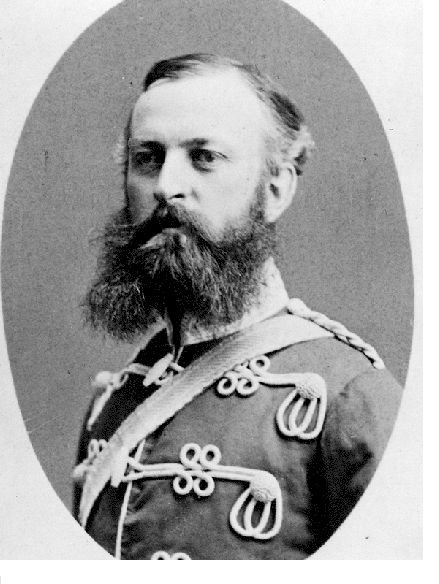
Dr. Israel Wood Powell became head of the Canada Party, which promoted Confederation. He was also elected to the colony’s legislature. He was Victoria’s first Superintendent of Education from 1867 to 1869. After Confederation in 1871, he became the Superintendent of Indian Affairs, a position for which he travelled up island. Powell River is named for him.
Dr. Powell also organized Victoria’s first militia, the Victoria Voluntary Rifles. As well, he served as the first president of the British Columbia Medical Counsel, and the first chancellor of the University of British Columbia.
Dr. Powell was involved in the Masonic Lodge for a lengthy period of time. He was initiated in the Corinthian Lodge in Ontario in March 1858. He was a Founding Worshipful Master in the Elgin Lodge in Montreal in 1861, and became a Provincial Grand Master in British Columbia in 1867. He was a Grand Master from 1867 to 1875.
William Dalby
(January 28,1839 - January 22, 1916)
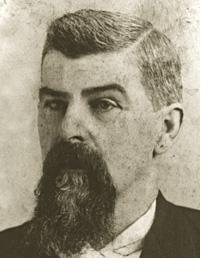
William Dalby came to Victoria in 1862, and was active in the business community. In 1889 he was the Manager of the Belmont Tanning and Boot and Shoe Manufacturing Company, and in 1892 he ran a Real Estate and Insurance business. In 1893 he was a member of the firm of Dalby & Claxton, Financial and Cannery Agents, but he returned to the Real Estate business in 1899. Dalby also served as the President of the Agricultural Association and as a Justice of the Peace.
Running as an Independant in the first provincial election in 1871, he lost to Amor De Cosmos, losing again in the 1874 by-election. Turning to municipal politics, he served as Mayor of Victoria from 1873 to 1875. He ran again in the seventh and eighth provincial elections, losing to Robert Beavan. Dalby was Grand Master from 1886 to 1887.
Angus McKeown
(1849 - 1935)
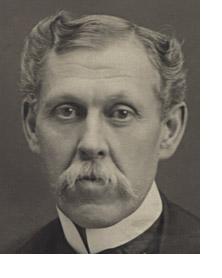
Angus McKeown came to British Columbia in 1885. He was employed by the Ames Holden Shoe Factory and worked his way up the ranks, eventually becoming superintendent and selling it to start a wholesale leather firm. He became interested in civic affairs, serving for one year on Victoria’s school board, and three years as an alderman.
He was initiated into freemasonry at the Bellevue Lodge in Ontario and was very involved with the Victoria-Columbia Lodge once he moved to Victoria. As Grand Master, he laid the cornerstone at the Vancouver YMCA and died as a Senior Past Grand Master.
Edward Gawler Prior
(May 21st, 1853 - December 12th, 1920)
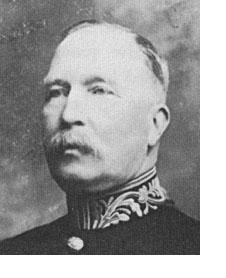
Edward Gawlor Prior was born in Yorkshire, England in 1853, and he arrived on Vancouver Island on December 9, 1873. He served in many offices in Nanaimo including Inspector of Mines, Sheriff, Government Agent, Assistant Commissioner of Lands, and Assessor. By 1880 he had moved to Victoria and become partners in a hardware business. In 1886 he was elected to the Legislature, resigning the same year to be acclaimed as a member of the House of Commons. He was re-elected in 1900.
Prior was initiated to the Victoria-Columbia Lodge no. 1 in 1891. On November 21, 1902 Robert Dunsmuir resigned as Premier and Prior was invited to form the new government. June 1, 1903 the Lieutenant-Governor had dismissed Prior due to a vote of non-confidence. This effectively ended Prior’s political career. He was later President of the Victoria Board of Trade and from December 1919,the BC Lieutenant-Governor.
Francis Mawson Rattenbury
(1867 - 1935)
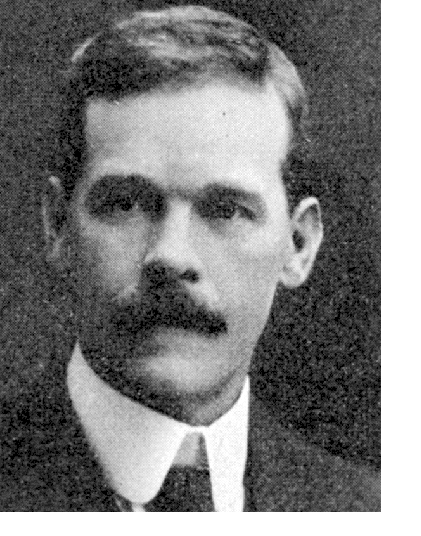
Francis Mawson Rattenbury was born in Leeds, England, in 1867. He arrived in British Columbia in 1891, after completing his architectural apprenticeship. He designed the BC Legislature Buildings, the Empress Hotel,and other buildings for the Canadian Pacific Railway. He was initiated into freemasonry on April 14th, 1893 in Vancouver.
Joseph Johnson Southgate
(b? - d?)
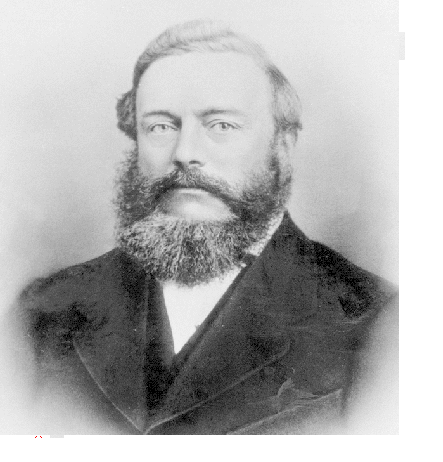
Joseph Johnson Southgate came to Victoria in 1859 from San Fransisco. While in Victoria, he was a successful merchant, co-owning a store on the southeast corner of Yates and Langley. His store, named Southgate and Mitchell (Mitchell, being his partner), sold liquor, coal, and other commissioned products.
On July 12, 1858, he allowed the first masonic meeting to take place in the upstairs portion of his store. From 1860-1863, he was a member of the Legislative Assembly of Vancouver Island, representing Salt Spring Island. When the first Lodge was founded in Victoria, he was the Lodge's first Worshipful Master.